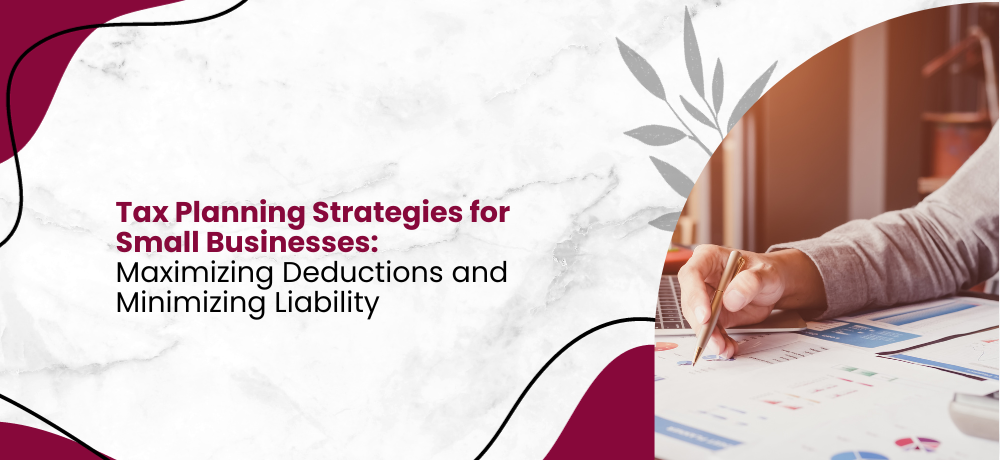
Tax Planning Strategies for Small Businesses: Maximizing Deductions and Minimizing Liability
- BR Accounting And Tax Service
Categories: Accountant , Accounting Services , Bookkeeping Services , Individual Taxes
Tax planning is a critical aspect of running a small business. For entrepreneurs and small business owners, navigating the complex landscape of taxation can be a daunting task. However, with careful planning and a strategic approach, it's possible to maximize deductions and minimize tax liability, ultimately retaining more of your hard-earned profits.
In this blog, we will explore a range of tax planning strategies tailored specifically for small businesses. We'll delve into the essential principles that every business owner should be aware of and provide practical insights to help you make informed decisions. Whether you're a sole proprietor, a partnership, an LLC, or a corporation, these strategies can be customized to suit your unique business structure and financial goals.
Understanding Tax Planning
Tax planning is not just about filling out forms before the deadline; it's a year-round process. Professionals emphasize proactive tax planning to ensure you're prepared for tax season. This involves assessing your business's financial health, identifying potential deductions, and strategizing to reduce your tax burden.
Tax planning involves a proactive and systematic approach to managing your financial affairs to legally minimize your tax liability. It's not about evading taxes but rather taking advantage of available deductions, credits, and exemptions. In essence, it's about optimizing your financial operations to ensure you pay only what you owe, no more and no less.
Leveraging Tax Planning and Deductions
One of the critical components of tax planning is identifying deductions specific to your business. The experts will guide you through the process of claiming these deductions correctly. Leveraging tax deductions is a vital strategy for small businesses looking to optimize their financial picture. By meticulously tracking and categorizing business expenses, entrepreneurs can reduce their taxable income, ultimately lowering their tax liability. This includes deductions for essential operating costs like rent, utilities, marketing, and travel expenses. Additionally, for those operating out of a home office, the home office deduction can be a significant advantage. It allows you to claim a portion of your housing expenses as a business deduction.
Depreciation of assets and deductions related to employee benefits and retirement contributions can further chip away at your tax burden. By mastering the art of tax deductions, small business owners can not only minimize their tax liability but also free up funds for investment in growth and innovation, ultimately fostering financial stability and success.
Structuring Your Business Tax-Efficiently
Structuring your business tax-efficiently is a pivotal step in optimizing your financial strategy. The way your business is legally organized can significantly impact your tax liability. For instance, sole proprietorships and partnerships typically pass their income through to the owner's personal tax return, while corporations may face double taxation. Choosing the right entity type, considering factors like size, industry, and future growth, is crucial. Furthermore, understanding tax regulations and credits specific to your business structure can further enhance tax efficiency.
It is a pivotal step in optimizing your financial strategy. The way your business is legally organized can significantly impact your tax liability. For instance, sole proprietorships and partnerships typically pass their income through to the owner's personal tax return, while corporations may face double taxation. Choosing the right entity type, considering factors like size, industry, and future growth, is crucial. Furthermore, understanding tax regulations and credits specific to your business structure can further enhance tax efficiency.
Tax Plans and Credits and Incentives
In addition to structuring your business smartly, harnessing available tax credits and incentives is another essential aspect of effective tax planning. Governments often provide various credits and incentives to encourage certain behaviors or investments, such as research and development, energy efficiency, and hiring in specific regions. Identifying and capitalizing on these opportunities can significantly reduce your tax burden and, in some cases, even result in refunds.
Tax credits and incentives are powerful tools that can significantly reduce your small business's tax liability while promoting activities deemed beneficial by governments. Understanding and utilizing these mechanisms can be a game-changer for your financial strategy.
Year-Round Tax Planning
Tax planning isn't a one-time event. It's an ongoing process that should adapt to your changing business circumstances. We'll provide you with practical tips on how to incorporate tax planning into your year-round financial strategy.
Year-round tax planning is a proactive approach to managing your finances. It involves consistently monitoring your income, expenses, and tax obligations throughout the year, rather than just at tax time. By staying vigilant and making strategic financial decisions throughout the year, you can optimize deductions, credits, and incentives, ensuring your small business retains more of its earnings and operates with financial efficiency.
In conclusion, for small businesses, effective tax planning is not just a financial strategy; it's a vital necessity. Maximizing deductions and minimizing tax liability can significantly impact a company's bottom line and long-term success. By implementing sound tax planning strategies, such as proper record-keeping, taking advantage of available credits and deductions, and staying informed about tax law changes, small businesses can retain more of their hard-earned revenue. Seeking the guidance of a tax professional is often a wise investment, ensuring compliance and optimizing tax benefits. Ultimately, proactive tax planning is a critical component of financial stability and growth for small businesses looking to thrive in a competitive market.
If you're looking for expert guidance in tax planning to boost your small business's financial health, then contact BR Accounting and Tax Service. With us, you're not just getting a tax preparer; you're gaining a tax planning partner.
Get in touch with us today
To learn more about what we do, please click here. To contact us, please click here or call us at (703) 221-5545.